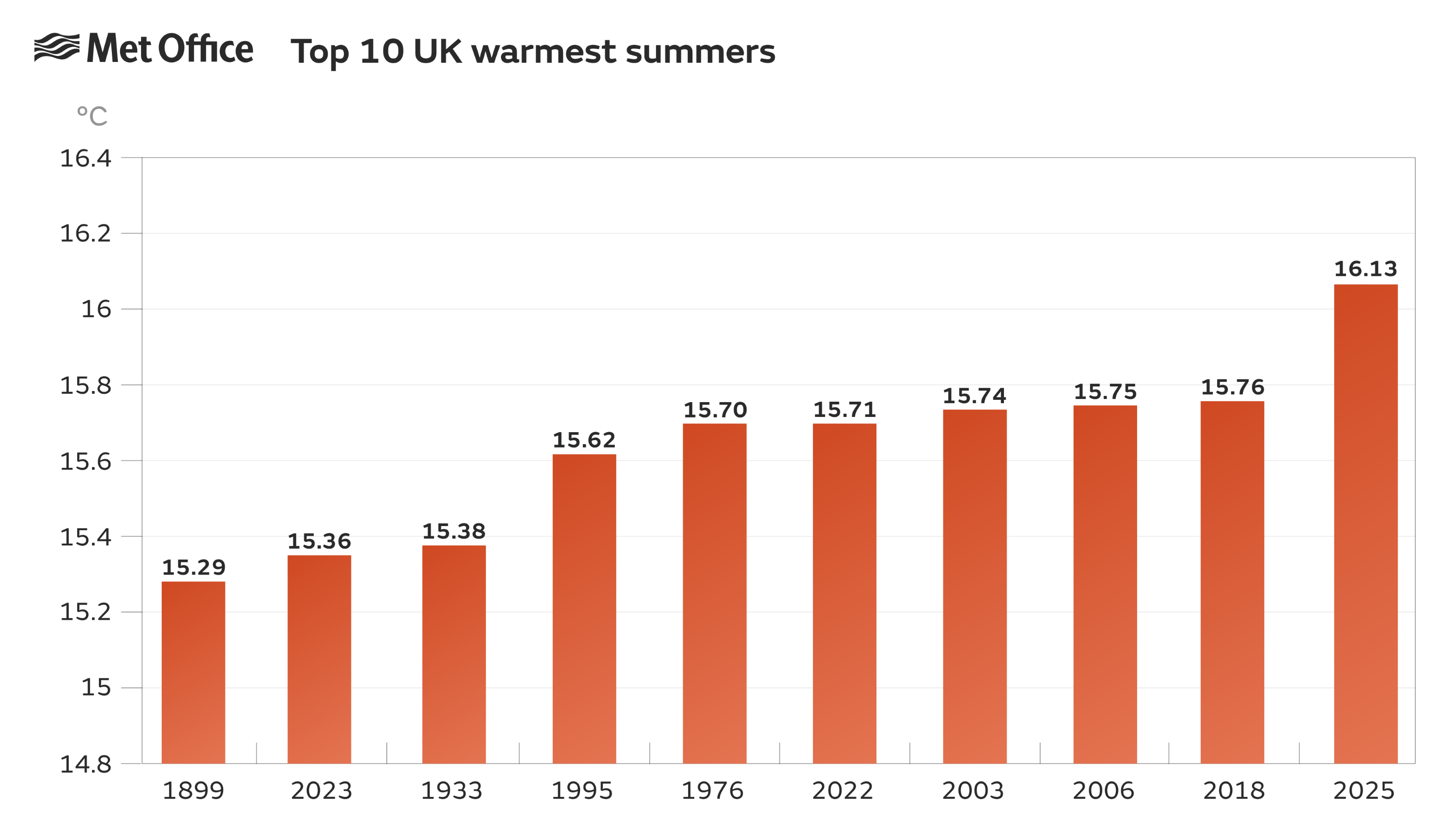This summer will ‘almost certainly’ be warmest on record for the UK
Author: Press Office
11:37 (UTC+1) on Tue 26 Aug 2025
Provisional statistics from the Met Office show that summer 2025 will ‘almost certainly’ be the warmest summer on record for the UK.
It would move 2018 off the top spot and relegate 1976 out of the top five warmest summer in a series which dates back to 1884.
The UK’s mean temperature from 1 June to 25 August currently stands at 16.13°C, which is 1.54°C above the long-term meteorological average. At present, 2018 is the warmest summer since 1884, with a mean temperature of 15.76°C.
Met Office scientist, Emily Carlisle, said: “Provisional Met Office statistics show that summer 2025 will almost certainly be the warmest summer on record. At present, mean temperature is tracking at 16.13°C. The current record is 15.76°C, set in 2018. So, unless temperatures are around four degrees below average for the rest of August - which the forecast does not suggest - it looks like the current record will be exceeded.
“This would move 1976 out of the top five warmest summers since 1884, leaving all five warmest summers having occurred since the year 2000.
“Of course, there are still a few days left of meteorological summer to go, but it’s very unlikely anything will stop summer 2025 from being the warmest on record.”
Temperatures look closer to average for the remainder of August, with unsettled weather set to conclude meteorological summer.
What are the current top warmest summers?
The below shows the top 10 UK warmest summers since 1884, with the current (as of today) 2025 mean temperature.

Consistently above-average temperatures
Both June and July delivered consistently above-average temperatures, with England recording its warmest June on record, while Wales and the UK overall saw their third and second warmest Junes respectively. July continued the trend, making it the UK’s fifth warmest July on record.
Four heatwaves so far
Four heatwaves have occurred so far this summer and whilst this may be unusual, each has been short-lived and interspersed with near-average conditions. None of the heatwaves have forced the UK highest maximum temperature of the year to particularly high levels, with the highest temperature recorded to date for 2025 35.8°C in Faversham, Kent. This is well below the UK’s all-time high of 40.3°C set in July 2022.
But it was warmer in 1976?
The summer of 1976 remains one of the most memorable in UK weather history. During this period, multiple locations across England recorded heatwave-like conditions lasting over two weeks. In 1976, there were 16 days in total in which temperatures exceeded 32°C. This compares to nine days recorded in 2025.
But, although 2025 hasn’t had such long-lived high temperature spikes, what is striking about this summer is the consistency of the warmth.
This persistent warmth is driven by a combination of factors including dry ground from spring, high-pressure systems, and unusually warm seas around the UK. These conditions have created an environment where heat builds quickly and lingers.
Both maximum and minimum temperatures have also been significantly above average, with minimum temperatures especially so.
What about climate change?
During the period 1991-2020, the mean summer temperature was 14.59°C, this is over 0.8°C more than the period 1961-1990. Climate projections show that future UK summers are going to become hotter and drier; a trend we are already witnessing.
Climate change has the power to turn previously unremarkable years into record-breaking ones, as baseline conditions steadily rise. This summer’s four heatwaves, which might once have passed as pleasant spells of warm weather, are made more prominent by the heightened backdrop that climate change creates.
Below average, but variable rainfall
So far this summer, rainfall is tracking below average, with 72% of the of the whole summer’s long-term average recorded. At this point in the season, you’d expect 93%. There is of course much regional variation, with central, southern and eastern parts of England and Wales so far especially dry, whilst north-western parts of the UK, especially Scotland, have been much wetter. England is currently tracking as the driest of the UK nations, and Scotland the wettest.
This all comes off the back of England's driest spring in more than 100 years and the driest January-July period since 1929.
But with some more unsettled weather in the forecast for the end of August, these figures will of course change.
Above-average sunshine
Sunshine amounts are also tracking ahead of average so far, with England especially sunny.
Why has it been so persistently warm?
Several factors have contributed to the persistent warmth, including a dominant high-pressure system and a significant marine heatwave around the UK enhancing air temperatures. Climate change is also playing a role, with the UK warming at a rate of approximately 0.25°C per decade. 2023, 2022 and 2018 are among the UK’s top ten warmest summers in records back to 1884.
The full, provisional August and Summer 2025 statistics will be release by the Met Office on Monday 1 September.
Read: People spend over two days a year talking about the weather






